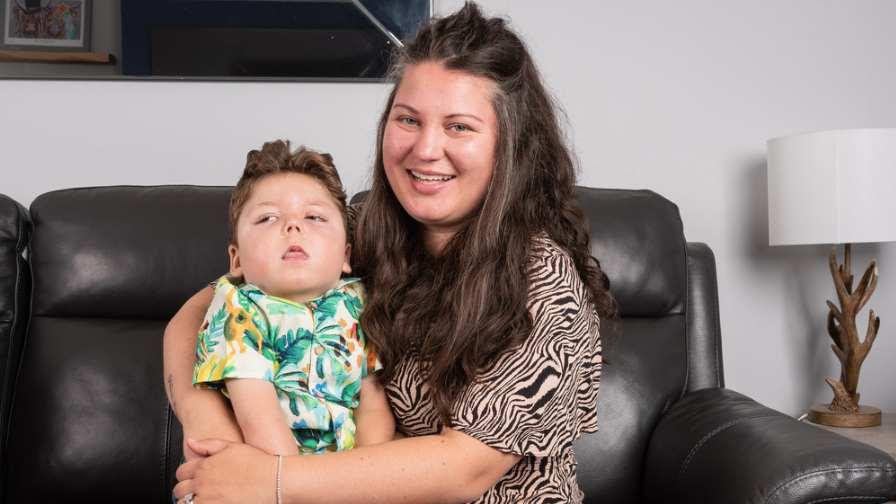At one point, Paddy was having up to 50 seizures a day.
Catherine’s call for more research into KCNT1-related epilepsy may be too late for her son Paddy, who was diagnosed with KCNT1-related epilepsy as a newborn, however, she hopes that it will help children around the world who live with KCNT1-related epilepsy and other rare diseases. Paddy, who is three, cannot walk or speak and needs 24 hour care. Catherine and James have had to face up to the fact that their son may never walk or talk and that he might not live to see his fifth birthday.
Catherine says: “Paddy has had thousands of seizures in his lifetime and at his worst, he was having 50 seizures a day. Even though he now has fewer seizures, they don’t get any easier for us to watch. We always ensure we are there to comfort him and hold his hand. Paddy is still like a newborn even though he will be four in June, but we try to live a normal life as possible.”
The diagnosis of KCTN1-related epilepsy has galvanised Catherine into carrying out research into the condition and treatments. She is passionate about campaigning for more research into KCTN1-related epilepsy to help families not just in the UK, but across the world, and has spoken to local, national and international groups. She explains: “I never thought that I would be learning about epilepsy, medical research or be a spokesperson, so it has been a baptism of fire. I think it’s great that charities like Action Medical Research are funding research into KCNT1-related epilepsy, as there are no effective treatments or cures available.”

Children’s health charity Action Medical Research is funding research into KCNT1-related epilepsies and has launched its campaign to help raise funds and encourage awareness of the importance of more research into rare diseases in children. The charity is funding a research project at the University of Leeds which aims to identify possible new treatments. The researchers previously used computer-based approaches to screen millions of different chemical compounds, to determine which compounds could have the ability to block the activity of the KCNT1 protein. It is faults in the KCNT1 gene that make the KCNT1 protein overactive, which leads to abnormal electrical activity in nerve cells resulting in seizures. The next step is to carry out laboratory tests to determine whether any of the chemicals identified might also have the right properties to be developed into a new medicine which could control seizures and prevent damage to children’s brains. This could improve quality of life and help transform the lives of children and families affected by these devastating conditions.
Sarah Moss, Director of Communications at Action Medical Research, comments: “We are committed to funding research into rare diseases and our support of early stage research is often the starting point for further work that leads to new treatments. This research could also lead to treatments for other drug resistant types of epilepsy or other rare conditions which cause seizures in children.”
75% of all rare diseases affect children – and 30% of children with a rare condition will lose their lives before their fifth birthday.[1] Thousands of children across the UK, like Paddy, are living with rare and devastating diseases that have no cures. Action Medical Research is striving to develop treatments and cures to tackle rare diseases that cause so much suffering for children and their families. Medical research gives hope – hope for new treatments, hope for a cure and hope that no family will have to go through the heartbreak of losing a child to a rare disease.
The charity is currently appealing for support as part of its Children’s Rare Disease Research Campaign, to help raise funds for research into rare diseases and conditions that affect children. Please visit: www.action.org.uk/rare.
References
- Department of Health & Social Care. England Rare Diseases Action Plan 2022. Available at: England Rare Diseases Action Plan 2022 - GOV.UK (www.gov.uk). [Accessed February 2023].
